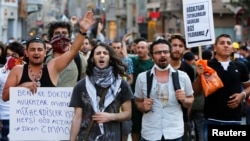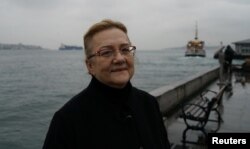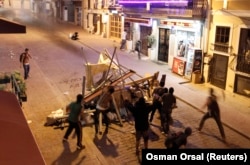Three years after she was acquitted over her role in Turkey's Gezi Park protests, Mucella Yapici was called in last month by police to face more questions about the unrest that had posed a direct challenge to the authority of President Tayyip Erdogan.
Yapici is one of dozens who were involved in demonstrations that brought millions onto Turkey's streets in 2013 to protest against the government and who are now caught up in a renewed investigation, raising concerns among Turkey's Western allies.
Opposition figures say the renewed crackdown is designed to polarize public opinion and rally support for Erdogan's AK Party ahead of local elections in March, when it could face tight races in some of Turkey's largest cities.
"It is a political maneuver," Yapici said of her questioning two weeks ago. "We were tried in Turkish courts and acquitted. And the state did not appeal," she told Reuters, adding that authorities had produced no new evidence.
The moves by prosecutors and police have been accompanied by renewed and sharp criticism of the Gezi protesters by Erdogan.
Such attacks have been a hallmark of his election triumphs since he first won power 16 years ago. But they also risk alienating allies such as the European Union and United States at a time when Turkey is trying to resolve diplomatic disputes that helped fuel a currency crisis this year.
Yapici, a 67-year-old architect whose activist group Taksim Solidarity was at the heart of the Gezi protests, was one of 26 defendants acquitted in April 2015 of charges carrying jail terms of up to 13 years.
She said the investigations were an attempt to rewrite social memory of the protests.
"They are trying to blacken the clear celebration of democracy that was Gezi in the minds of children, youths and society," Yapici said.
She has not been charged again, but last month more than a dozen people were detained as part of an investigation into the Gezi protests and prosecutors have issued warrants for a prominent journalist and an actor, both living abroad.
"Five years later the prosecutor has suddenly remembered the Gezi resistance and started a new witch hunt," the Berlin-based journalist, Can Dundar, said after details of his arrest warrant emerged on Dec. 5.
A senior Turkish official said the Gezi incidents were solely a matter for the courts.
"Of course the government does not make any requests in this respect," he told Reuters. "Ultimately courts and prosecutors take various steps in cases based on the evidence which they obtain."
"It is not a matter of the incidents specially being put onto the agenda five years later," he added. "Ultimately the judiciary will take up these dossiers and reach the necessary verdicts."
'Pay the price'
According to government estimates, 3.6 million people took part in the Gezi protests, which began with a small demonstration against the redevelopment of a park near Istanbul's Taksim Square. It evolved into a demonstration of wide-ranging discontent with the government.
Over the summer of 2013 the chant "everywhere is Taksim, everywhere is resistance" resounded in daily protests across Turkey, with many banging pots and pans at their windows every evening. Nine people, eight young protesters and a police officer, were killed in the unrest, and 5,000 injured.
Three years later, following a failed coup against Erdogan, authorities launched a sweeping roundup in which 77,000 people have so far been jailed pending trial. A two-year state of emergency was lifted in July, but arrests linked to the coup attempt have continued alongside the revived Gezi investigations.
Prosecutors have prepared an indictment targeting 120 people over their participation in a Gezi-related protest in Ankara and an investigation into 600 others is continuing, state media says. Pro-government journalists say the probe will widen.
Erdogan blames the protests on billionaire philanthropist George Soros and Osman Kavala, a well-known Turkish civil society leader. Kavala has been in jail for a year awaiting trial on charges of seeking to overthrow the government.
"They are still in solidarity, the operatives of the project to make our country surrender," Erdogan said last month in a speech denouncing the two men. Kavala was directed by "the famous Hungarian Jew, Soros ... who assigns people to divide nations", he said.
Two weeks ago the Soros-funded Open Society Foundation announced it was closing down in Turkey because it could no longer work there.
Responding to last month's arrest of 13 academics and civil society representatives linked to Kavala, EU commissioner Johannes Hahn said Brussels was troubled by the arrest of journalists, human rights defenders and civil society activists.
"Criminal and judicial proceedings must be based on the presumption of innocence," he said after talks in Ankara with Turkey's foreign minister.
'Hatred and revenge'
The leader of the main opposition CHP party, which is challenging Erdogan's AK Party for control of Istanbul and Ankara in the March elections, has said there are no grounds for the latest protest-related arrests.
"If you throw innocent people in jail and then go and see where you can create evidence, there is no justice there. There is a feeling of hatred and revenge," Kemal Kilicdaroglu said.
Kilicdaroglu's party say the Gezi arrests are an attempt to divert attention from a slowing economy, high inflation and rising unemployment - significant weak points in Erdogan's election plans after years of stellar economic growth.
By focusing on perceived security threats, Erdogan could rally support. A survey for the Center for American Progress this year found that around half the public approved of the government's response to the failed coup in 2016, including 80 percent of AK Party voters.
The challenge, however, will be significant.
Although he strengthened his presidential powers after elections in June, support for Erdogan's AK Party fell to 43 percent, meaning he needed an alliance with nationalists for a parliamentary majority.
A survey by pollster Metropoll last month showed his personal approval had fallen below 40 percent, having been around 50 percent ahead of the June elections.
Aykut Erdogdu, a CHP lawmaker for Istanbul, said trust in Erdogan was declining due to economic hardship.
As things stand "they know they will lose the local elections. Hence it is necessary to polarize the people," Erdogdu wrote on Twitter. "They are setting up their election stall using Gezi."







